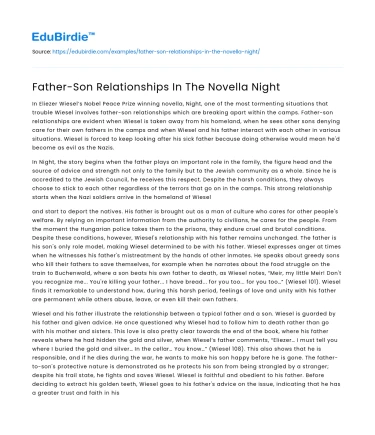In Eliezer Wiesel’s Nobel Peace Prize winning novella, Night, one of the most tormenting situations that trouble Wiesel involves father-son relationships which are breaking apart within the camps. Father-son relationships are evident when Wiesel is taken away from his homeland, when he sees other sons denying care for their own fathers in the camps and when Wiesel and his father interact with each other in various situations. Wiesel is forced to keep looking after his sick father because doing otherwise would mean he'd become as evil as the Nazis.
In Night, the story begins when the father plays an important role in the family, the figure head and the source of advice and strength not only to the family but to the Jewish community as a whole. Since he is accredited to the Jewish Council, he receives this respect. Despite the harsh conditions, they always choose to stick to each other regardless of the terrors that go on in the camps. This strong relationship starts when the Nazi soldiers arrive in the homeland of Wiesel
Save your time!
We can take care of your essay
- Proper editing and formatting
- Free revision, title page, and bibliography
- Flexible prices and money-back guarantee
and start to deport the natives. His father is brought out as a man of culture who cares for other people's welfare. By relying on important information from the authority to civilians, he cares for the people. From the moment the Hungarian police takes them to the prisons, they endure cruel and brutal conditions. Despite these conditions, however, Wiesel's relationship with his father remains unchanged. The father is his son's only role model, making Wiesel determined to be with his father. Wiesel expresses anger at times when he witnesses his father's mistreatment by the hands of other inmates. He speaks about greedy sons who kill their fathers to save themselves, for example when he narrates about the food struggle on the train to Buchenwald, where a son beats his own father to death, as Wiesel notes, “Meir, my little Meir! Don't you recognize me... You're killing your father... I have bread... for you too... for you too…” (Wiesel 101). Wiesel finds it remarkable to understand how, during this harsh period, feelings of love and unity with his father are permanent while others abuse, leave, or even kill their own fathers.
Wiesel and his father illustrate the relationship between a typical father and a son. Wiesel is guarded by his father and given advice. He once questioned why Wiesel had to follow him to death rather than go with his mother and sisters. This love is also pretty clear towards the end of the book, where his father reveals where he had hidden the gold and silver, when Wiesel’s father comments, “Eliezer… I must tell you where I buried the gold and silver… In the cellar… You know…” (Wiesel 108). This also shows that he is responsible, and if he dies during the war, he wants to make his son happy before he is gone. The father-to-son's protective nature is demonstrated as he protects his son from being strangled by a stranger; despite his frail state, he fights and saves Wiesel. Wiesel is faithful and obedient to his father. Before deciding to extract his golden teeth, Wiesel goes to his father's advice on the issue, indicating that he has a greater trust and faith in his father's words than anyone else.
During his life in the camp Wiesel is totally dependent on his father and he follows him every step he takes. Wiesel even teaches his father how to march properly to keep him by his side. His actions and feelings are a direct reflection of his father's dependence. They value each other and are mutually dependent. During their stay at the camps, they pray, cook, share and sleep together. This becomes a deep, unconditional love for each other. This peer-like relationship goes all the way to the book's end. During the 42-mile run to Gleiwitz, Wiesel helps his father along the way. He gives him support all the way through, as Wiesel states, “I inched my way through the crowd. Several SS men rushed to find me, creating such confusion that a number of people were able to switch over to the right - among them my father and I” (Wiesel 96). Although sometimes they were forced to separate, Wiesel always went back to look for his father amongst the crowd. During the 42-mile run, they begin to play the opposite of their presumed roles. The relationship changes towards the end of the book, becoming the opposite of the initial. Wiesel is becoming a father-like figure. During the run, he helps his father and advises him on why they have to run. His father is becoming extremely vulnerable, frightened, weak and more of a child. These actions clearly demonstrate that Wiesel has become mature enough to be a parental figure and has a responsibility to take care of his father.
In spite of the difficulties in the relationship between Wiesel and his father, the father-son relationship was not totally overdone. In Eliezer Wiesel’s Nobel Peace Prize winning novella, Night, Wiesel still had the same respect, trust and love for his father. He still saw him as his role-model, and until his death, he loved him entirely. His father also played a parental role by giving him his inheritance in the form of gold and silver that he had hidden from the Nazis. It is a simple example of a good father-to-son relationship that young people in today's culture can imitate.






 Stuck on your essay?
Stuck on your essay?

